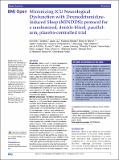| dc.contributor.author | Shelton, Kenneth T | |
| dc.contributor.author | Qu, Jason | |
| dc.contributor.author | Bilotta, Federico | |
| dc.contributor.author | Brown, Emery Neal | |
| dc.contributor.author | Cudemus, Gaston | |
| dc.contributor.author | D’Alessandro, David A | |
| dc.contributor.author | Deng, Hao | |
| dc.contributor.author | DiBiasio, Alan | |
| dc.contributor.author | Gitlin, Jacob A | |
| dc.contributor.author | Hahm, Eunice Y | |
| dc.contributor.author | Hobbs, Lauren E | |
| dc.contributor.author | Houle, Timothy T | |
| dc.contributor.author | Ibala, Reine | |
| dc.contributor.author | Loggia, Marco | |
| dc.contributor.author | Pavone, Kara J | |
| dc.contributor.author | Shaefi, Shahzad | |
| dc.date.accessioned | 2020-08-14T22:58:30Z | |
| dc.date.available | 2020-08-14T22:58:30Z | |
| dc.date.issued | 2018-03 | |
| dc.date.submitted | 2018-02 | |
| dc.identifier.uri | https://hdl.handle.net/1721.1/126604 | |
| dc.description.abstract | Introduction Delirium, which is prevalent in postcardiac surgical patients, is an acute brain dysfunction characterised by disturbances in attention, awareness and cognition not explained by a pre-existing neurocognitive disorder. The pathophysiology of delirium remains poorly understood. However, basic science and clinical studies suggest that sleep disturbance may be a modifiable risk factor for the development of delirium. Dexmedetomidine is a α-2A adrenergic receptor agonist medication that patterns the activity of various arousal nuclei similar to sleep. A single night-time loading dose of dexmedetomidine promotes non-rapid eye movement sleep stages N2 and N3 sleep. This trial hypothesises dexmedetomidine-induced sleep as pre-emptive therapy for postoperative delirium. Methods and analysis The MINDDS (Minimizing ICU Neurological Dysfunction with Dexmedetomidine-induced Sleep) trial is a 370-patient block-randomised, placebo-controlled, double-blinded, single-site, parallel-arm superiority trial. Patients over 60 years old, undergoing cardiac surgery with planned cardiopulmonary bypass, will be randomised to receive a sleep-inducing dose of dexmedetomidine or placebo. The primary outcome is the incidence of delirium on postoperative day 1, assessed with the Confusion Assessment Method by staff blinded to the treatment assignment. To ensure that the study is appropriately powered for the primary outcome measure, patients will be recruited and randomised into the study until 370 patients receive the study intervention on postoperative day 0. Secondary outcomes will be evaluated by in-person assessments and medical record review for in-hospital end points, and by telephone interview for 30-day, 90-day and 180-day end points. All trial outcomes will be evaluated using an intention-to-treat analysis plan. Hypothesis testing will be performed using a two-sided significance level (type I error) of α=0.05. Sensitivity analyses using the actual treatment received will be performed and compared with the intention-to-treat analysis results. Additional sensitivity analyses will assess the potential impact of missing data due to loss of follow-up. Ethics and dissemination The Partners Human Research Committee approved the MINDDS trial. Recruitment began in March 2017. Dissemination plans include presentations at scientific conferences, scientific publications and popular media. Trial registration number NCT02856594. | en_US |
| dc.language.iso | en | |
| dc.publisher | BMJ Publishing Group | en_US |
| dc.relation.isversionof | https://bmjopen.bmj.com/content/8/4/e020316 | en_US |
| dc.rights | Creative Commons Attribution NonCommercial License 4.0 | en_US |
| dc.rights.uri | https://creativecommons.org/licenses/by-nc/4.0/ | en_US |
| dc.source | BMJ | en_US |
| dc.title | Minimizing ICU Neurological Dysfunction with Dexmedetomidine-induced Sleep (MINDDS): Protocol for a randomised, double-blind, parallel-arm, placebo-controlled trial | en_US |
| dc.type | Article | en_US |
| dc.identifier.citation | Shelton, Kenneth T. et al. "Minimizing ICU Neurological Dysfunction with Dexmedetomidine-induced Sleep (MINDDS): Protocol for a randomised, double-blind, parallel-arm, placebo-controlled trial." BMJ Open 8, 4 (March 2018): e020316 © 2018 The Author(s) | en_US |
| dc.contributor.department | Massachusetts Institute of Technology. Institute for Medical Engineering & Science | en_US |
| dc.contributor.department | Massachusetts Institute of Technology. Department of Brain and Cognitive Sciences | en_US |
| dc.relation.journal | BMJ Open | en_US |
| dc.eprint.version | Final published version | en_US |
| dc.type.uri | http://purl.org/eprint/type/JournalArticle | en_US |
| eprint.status | http://purl.org/eprint/status/PeerReviewed | en_US |
| dc.date.updated | 2019-09-30T15:44:58Z | |
| dspace.date.submission | 2019-09-30T15:45:00Z | |
| mit.journal.volume | 8 | en_US |
| mit.journal.issue | 4 | en_US |
| mit.license | PUBLISHER_CC | |
| mit.metadata.status | Complete | |
